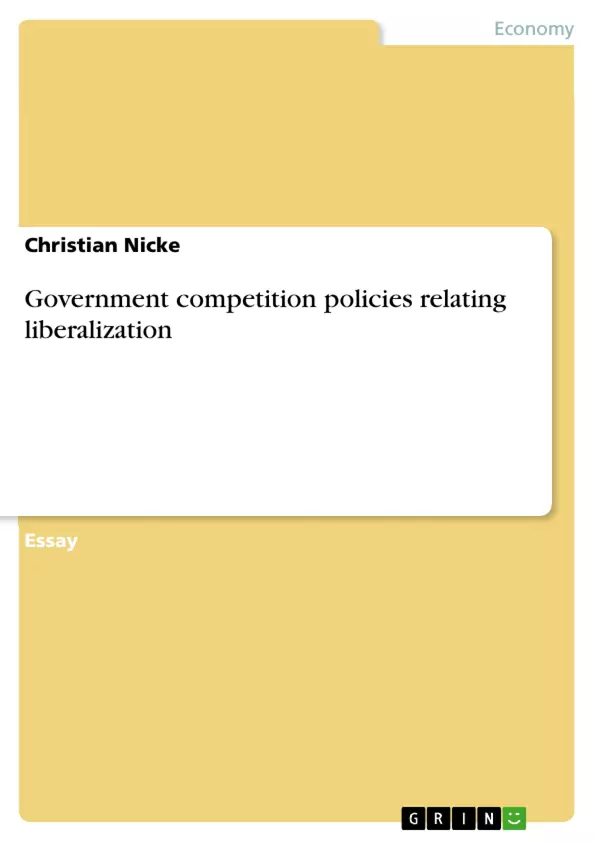“Almost all market competitors are firms – business organizations (social groupings) that are, for the most part, internally cooperative, not competitive. Firms are the principal suppliers and buyers of most products and services, while consumers (households) generally buy only final goods (…). Typical market transactions involve competition among firms. Many of these firms, including subtypes such as labour unions, can legally own and exchange property and differentiate and isolate their legal liability as a group from the inability of their members.” The competitive-cooperative market system is controlled by formal social regulations we call competition policy. This term refers to the body of laws of a state which govern the extent, and ability, to which bodies can economically compete. They hence to restrict practises that can pull down market competition such as monopoly or cartel. Most nations have an own legal competition framework, and there is a general agreement on what is and what is not acceptable behaviour.
“In general, liberalization refers to a relaxation of previous government restrictions, usually in areas of social or economic policy. (…) Most often, the term is used to refer to economic liberalization, especially trade liberalization or capital market liberalization, policies often referred to as neoliberalism. One of the world’s most open trade ad investment regime is the one of the United States. However, a liberalized and deregulated market has to be supported by rules of the game to ensure competition. But although economic liberalization often is associated with privatization, the two can be quite separate processes. As an example, in the European Union the gas and electricity markets were liberalized a few years ago, instituting a system of competition; but some of the leading European energy companies (such as EDF or Vattenfall) remain partially or complete in public ownership.
“Liberalized and privatized public services may be dominated by just a big few big companies, particularly in sectors with high capital costs, or high sunk cost, such as water, gas and electricity. In some cases they may remain legal monopolies, at least for some part of the market” (i.e. parts of postal service in Germany a few years ago).
Inhaltsverzeichnis (Table of Contents)
- DEFINITIONS
- Competition policy
- Market Liberalization
- THE STATE'S ROLE
- COMPETITION AND LIBERALIZATION
- Competition Policy in the United States of America
- Involved government agencies
- General principles of competition policy of the United States
- Competition Policy in the European Union
- Effects of antitrust and competition law on liberalization
- Overview
- Liberalization in the United States - how it works
- Liberalization in the European Union - how it works
Zielsetzung und Themenschwerpunkte (Objectives and Key Themes)
This essay examines the relationship between government competition policies and market liberalization, focusing on the United States and the European Union as key examples. It explores the role of the state in shaping competition policies, analyzes the effects of antitrust and competition laws on liberalization processes, and investigates how liberalization works in practice within different economic sectors.
- The role of government in shaping competition policy
- The impact of competition policy on market liberalization
- The effectiveness of liberalization in different sectors
- The interplay between antitrust laws and market competition
- The dynamics of competition and liberalization in the US and EU
Zusammenfassung der Kapitel (Chapter Summaries)
The first chapter defines key terms, establishing the foundation for understanding competition policy and market liberalization. The second chapter explores the state's role in shaping economic organization and the significance of competition policy in ensuring efficient production and market fairness. The third chapter delves into the specific competition policies of the United States and the European Union, outlining their respective government agencies involved in implementing these policies. It also details how antitrust and competition law affect liberalization processes in both regions, using the telecommunications market as an illustrative example.
Schlüsselwörter (Keywords)
This essay focuses on the interplay between government competition policies and market liberalization. Key themes include antitrust law, market regulation, government intervention, economic liberalization, and the roles of state agencies in shaping market dynamics. The essay specifically analyzes the competition policies of the United States and the European Union, highlighting key examples and real-world applications of liberalization in different sectors.
Frequently Asked Questions
What is the difference between competition policy and liberalization?
Competition policy refers to laws governing economic competition (e.g., antitrust), while liberalization is the relaxation of government restrictions to open markets to competition.
How does competition policy work in the United States?
The US has one of the world's most open regimes, supported by antitrust laws that ensure fair play and prevent monopolies, managed by agencies like the FTC and the Department of Justice.
Can liberalized markets still have monopolies?
Yes, especially in sectors with high capital costs like water or electricity. In some cases, legal monopolies remain for parts of the market even after liberalization.
What is the state's role in a liberalized market?
The state acts as a regulator to ensure the "rules of the game" are followed. Even in liberalized markets (like energy in the EU), some companies may remain in public ownership.
How has liberalization affected the telecommunications sector?
The essay uses telecommunications as an example of how antitrust and competition laws facilitate market opening and prevent dominant players from stifling new competitors.
- Citar trabajo
- Dipl.-Betriebswirt (FH) Christian Nicke (Autor), 2006, Government competition policies relating liberalization, Múnich, GRIN Verlag, https://www.grin.com/document/80455



